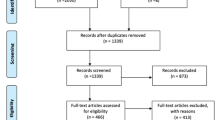Abstract
Few studies have evaluated the effectiveness of mindfulness-based meditation interventions (MBMIs) among Latino youth. Furthermore, joint parent–child participation in such programs is rare. Utilizing a community-based participatory research approach, this study evaluated the feasibility of a pilot bilingual MBMI among Latino adolescents and their parents in Los Angeles. Qualitative interviews were conducted to assess the practicality, implementation, and acceptability of the program. Challenges to attendance included health issues or conflicts with work. Several adolescents struggled with distractions from peers. However, overall responses suggest that parents and children found the program convenient and enjoyable, and perceived benefits from the curriculum. This study supports the feasibility of a MBMI among Latino family dyads.
Similar content being viewed by others
References
Gonzales N, Dumka L, Millsap R, et al. Randomized trial of a broad preventive intervention for Mexican American adolescents. J Consult Clin Psychol. 2012;80:1–16.
Gillock KL, Reyes O. Stress, supports, and academic performance of urban, low-income, Mexican–American adolescents. J Youth Adolesc. 1999;28:259.
Aneshensel CS, Mitchell UA. The Stress Process: Its Origins, Evolution, and Future. In: Johnson RJ, Turner RJ, Link BG, editors. Sociology of mental health: selected topics from 40 Years 1970s–2010s. Cham: Springer International Publishing; 1970s. p. 53–74.
Schwartz SJ, Unger JB, Baezconde-Garbanati L, et al. Trajectories of cultural stressors and effects on mental health and substance use among Hispanic immigrant adolescents. J Adolesc Health. 2015;56:433–9.
U.S. Population Projections: 2005–2050. Pew Research Center. Washington, D.C., February 11, 2008.
Herts KL, McLaughlin KA, Hatzenbuehler ML. Emotion dysregulation as a mechanism linking stress exposure to adolescent aggressive behavior. J Abnorm Child Psychol. 2012;40:1111–22.
Cardoso JB, Goldbach JT, Cervantes RC, Swank P. Stress and multiple substance use behaviors among hispanic adolescents. Prev Sci. 2016;17:208–17.
Albeg LJ, Castro-Olivo SM. The relationship between mental health, acculturative stress, and academic performance in a Latino Middle School Sample. Contemp Sch Psychol. 2014;18:178–86.
Bogart LM, Elliott MN, Kanouse DE, et al. Association between perceived discrimination and racial/ethnic disparities in problem behaviors among pre-adolescent youth. Am J Public Health. 2013;103:1074–81.
Beckles GL, Truman BI. CDC health disparities and inequalities report—United States, 2013. MMWR Morb Mortal Wkl Rep. 2013;62:9–19.
Rice EH, Yen C-J. Examining gender and the academic achievement of students with emotional disturbance. Educ Treat Child. 2010;33:601–21.
Franko DL, Thompson D, Affenito SG, Barton BA, Striegel-Moore RH. What mediates the relationship between family meals and adolescent health issues? Health Psychol. 2008;27:S109–S117117.
Van Ryzin MJ, Nowicka P. Direct and indirect effects of a family-based intervention in early adolescence on parent−youth relationship quality, late adolescent health, and early adult obesity. J Fam Psychol. 2013;27:106–16.
Laurent HK. Clarifying the contours of emotion regulation: insights from parent–child stress research. Child Dev Perspect. 2014;8:30–5.
Kabat-Zinn J. Clinical Handbook of Mindfulness. New York: Springer; 2009.
Robinson JM, Ladd BO, Anderson KG. When you see it, let it be: Urgency, mindfulness and adolescent substance use. Addict Behav. 2014;39:1038–41.
Karyadi KA, VanderVeen JD, Cyders MA. A meta-analysis of the relationship between trait mindfulness and substance use behaviors. Drug Alcohol Depend. 2014;143:1–10.
Broderick PC, Jennings PA. Mindfulness for adolescents: a promising approach to supporting emotion regulation and preventing risky behavior. New Dir Youth Dev. 2012;2012:111–26.
Tan LBG. A critical review of adolescent mindfulness-based programmes. Clin Child Psychol Psychiatry. 2016;21:193–207.
Minkler M, Wallerstein N. Community based participatory research for health. San Francisco: Jossey-Bass; 2003.
Hovmand PS. Group model building and community-based system dynamics process. Community Based System Dynamics: Springer; 2014. p. 17–30.
Wartenberg D, Groves FD, Adelman AS. Acute lymphoblastic leukemia: epidemiology and etiology. Acute leukemias: Springer; 2008. p. 77–93.
Prasad PK, Bowles T, Friedman DL. Is there a role for a specialized follow-up clinic for survivors of pediatric cancer? Cancer Treat Rev. 2010;36:372–6.
Escobedo P, Dominguez K, Kuhlberg J, Calanche ML, Baezconde-Garbanati L, Contreras R, Bluthenthal R. Community needs assessment among Latino families in an urban public housing development. Hisp J Behav Sci. 2019;41(3):344–62.
Bowen DJ, Kreuter M, Spring B, et al. How we design feasibility studies. Am J Prev Med. 2009;36:452–7.
ATLAS.ti. Berlin: ATLAS.ti Scientific Software Development GmbH, 2015.
Harnett PH, Dawe S. The contribution of mindfulness-based therapies for children and families and proposed conceptual integration. Child Adolesc Mental Health. 2011;17:195–208.
Duncan LG, Coatsworth JD, Greenberg MT. A model of mindful parenting: implications for parent-child relationships and prevention research. Clin Child Fam Psychol Rev. 2009;12:255–70.
Bogels SM, Lehtonen A, Restifo K. Mindful parenting in mental health care. Mindfulness. 2010;1:107–20.
Masuda A, Shoup A, Solis M. ebrary: Mindfulness and acceptance in multicultural competency: a contextual approach to sociocultural diversity in theory and practice. Oakland, California: Context Press; 2014.
Sass SM, Berenbaum H, Abrams EM. Discomfort with emotion moderates distress reduction in a brief mindfulness intervention. Int J Behav Consult Ther. 2013;7:24–7.
Baer R, Crane C, Miller E, Kuyken W. Doing no harm in mindfulness-based programs: conceptual issues and empirical findings. Clin Psychol Rev. 2019;71:101–14.
Acknowledgments
From Bienestar: Flor Vindel, Ying Yung Chen. From Legacy LA: Ruby Rivera, Sarah Reyes, Isaac Caldera, Jeanny Marroquin, Isabel Marquez, Martha Gonzalez, Marlene Arazo, Karina Licon, Evangeline Ordaz. From USC: Amy Rodriquez, Maryann Pentz, Tess Cruz, Jennifer Unger, Patricia Escobedo, James Thing, Jimi Huh, Michael Li, Donna Spruijt-Metz. Consultants: Community Advisory Board Members, Peter Hovmand, Jill Kuhlberg. A special thanks to all the individuals who gave their time to participate in this project.
Funding
This study was funded by the National Cancer Institute (T32CA009492), the National Institute on Minority Health and Health Disparities (Grant #: R24MD007978, Program Official: Sheila McClure) & the USC Good Neighbors Program.
Author information
Authors and Affiliations
Corresponding author
Ethics declarations
Conflict of interest
The authors declare that they have no conflict of interest.
Additional information
Publisher's Note
Springer Nature remains neutral with regard to jurisdictional claims in published maps and institutional affiliations.
Rights and permissions
About this article
Cite this article
Tobin, J., Hardy, J., Calanche, M.L. et al. A Community-Based Mindfulness Intervention Among Latino Adolescents and Their Parents: A Qualitative Feasibility and Acceptability Study. J Immigrant Minority Health 23, 344–352 (2021). https://doi.org/10.1007/s10903-020-00985-9
Published:
Issue Date:
DOI: https://doi.org/10.1007/s10903-020-00985-9




